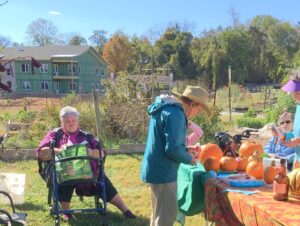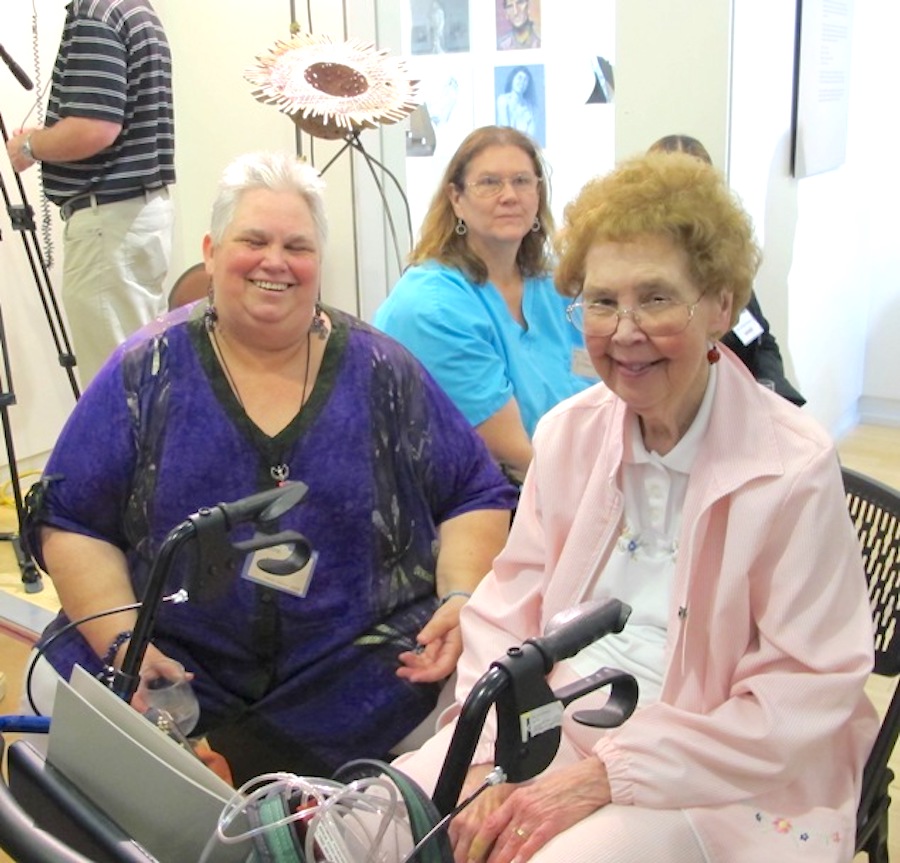By Loraine Hutchins
Is this it?
This week, I had a painful intestinal symptom for several days and wasn’t sure it would go away. I’m old enough (73, with chronic health problems) that it scared me. My mother died partly due to intestinal distress, as did my grandmother, her mother, my feminist foremother. I got frightened about what my symptoms meant. I despaired how little I trust modern medicine as a guide or resource. I remembered these lines I wrote earlier this year about mercy.
Mercy is grace.
Mercy means I am not alone, nor are you.
Mercy means the kindness of strangers, and familiars.
Mercy means being kind to myself.
Mercy is a tenderness hard for me to fathom sometimes when I am most enraged and/or frightened.
Mercy is a balm that calms me.
Mercy surprises me and I am honored by its manifestation.
When I was young, educated, and with white privilege, I took mercy for granted. Since then, I have somatically swum in others’ injuries as well as my own, and puzzled—yearned—how to assuage, heal, balance, make just.
Today, I am elderly and disabled, with still some privilege that, yes, protects me. But why am I connecting privilege and mercy; need there be any link?
However, this is where my fear is rooted and, as Dorothy Allison* says, we must write through our fears.
I struggle now with asking for what I want because I am ashamed of the limits of my disabilities, immediate everyday barriers that interfere with participating in my community, at its events.
Example A: there is an historic event scheduled in town next month. I could easily arrange to participate in it, even ask to be featured in the panel-of-experts discussion because of my past credentials as an LGBTQ historian of record with published pieces. But just the prospect of getting there, of making sure there is nearby parking and quick access to a restroom, and insisting that meetings not be held at remote locations that are difficult for me to attend, plagues me with anxieties that make it harder for me to reach out and ask for what I need. WHY?! I don’t want to be dependent upon the mercy of others. I don’t want to find out what is there and what is not, for me, for anyone, for all.
And yet, it is clear to me that I would not be here in this place, living this life, without the mercy of everyone here who creates this space at Friends House in a daily re-creating nurturing, nourishing, devout, loyal, loving, compassionate way. This is grace, this is mercy.
My friends fall down and break themselves, over and over again. They submit their bodies and spirits to treatments that intimidate me and leave me in awe and fear. I do not want to grow old and die, I just want to die when I’m ready, easily.
My fear is that I will fall with no one to catch me; that I will fall and not be put back together again. The falling is good, if I am held by the universe; is this all a big exercise in trust? The only thing, other than luck and angels, that will save me, really, I have come to believe these days, is the mercy of others. It really helps me to remember, in crisis emergency anxious panicked times: follow those who are helping, help the helpers, as Mr. Rogers advised on his children’s television show. His advice was invoked during Sept. 11, 2001—a day which it still feels like we are frozen in, in time.
I hear about Social Security cutbacks and food stamp cutbacks and no Medicare, limited aid to Puerto Rico, and the disproportionate deporting of people of color immigrants (but not the European or lighter-skinned ones who are here in huge numbers), and I wonder about the uneven mercy we show and don’t show.
I notice who has the money, who gets assisted living, and who cannot afford it at all, who must “make do.” These are women I live amongst, those who can “make it,” and those who cannot.
I watch how people with very little have a lot of generosity and mercy.
We are taught about mercy because it speaks deep into our hearts.
I am afraid of having to submit to the mercy of others feeding me, washing me, helping me breathe.
I have lost a lot of friends in this life—to AIDS, cancer, suicide, accidents, more. And am losing more and more. They teach me as they go, as much as I can absorb. I am still learning about mercy. I am a child where mercy goes. A child wondering how to be grateful and loving, how to work with the best within us all, and keep returning there, returning, returning, getting lost, getting scared, still returning. I think when I die, it will be surrounded by mercy and surrendering into mercy that I am still doubting I believe in.
My mother struggled the last 20 years of her life coming to peace with having me, an out, loud, and proud bisexual daughter. After our Bi Any Other Name: Bisexual People Speak Out anthology came out in the early ’90s, I helped my parents through reckoning with having an out bisexual daughter living in the same city as they do, same last name. Mostly, we worked out a good relationship for our family. My Dad died in 2001, and after that I spent a lot of time with my widowed mom, living alone for the first time in her life, at her retirement community, where she died in 2012.
Now I live in a retirement community and think a lot about dying, living well until we die, navigating our last years of health and breath together. I live in sisterhood with many other women at this Quaker-founded community in Maryland, nestled along the banks of one of the creeks that feeds the river systems that flow through Washington, DC, the Northwest Branch. It’s a beautiful place to face the end of one’s life. When I moved here, I learned about a resident-led program, “Living Well with Friends.” It ran out of its grant and died. Yet the ghost voices of people who lived here and died haunt the low-income studio apartments where we lived until 2020. The facility built a new apartment building for us, and in the midst of construction, staff turn-over, and COVID lockdown, we moved across campus to this facility because we had to, even though it severely disrupted our lives.
The good thing is that we are quite protected here. It is a tiny, Quaker-rooted village in an area of the country inhabited by a lot of Quakers where the Underground Railroad and Tubman roamed around back over a century ago. Back in the ’60s, some social activist Quakers helped build this place. Now, after the first round of expansion in years, there are several lodges arranged in condo-clusters and higher-income duplexes and cottages in a ring that surround the common houses, common space. We have virus tests and vaccines available, as well as some other basic services for our self-esteem and self-care, podiatrists and hair stylists. There is a dining room and bistro in the common space, and I now live in a three-floor newly-constructed tax-credit affordable housing building, where I have been part of helping organize our residents’ communication systems. I’m a coordinator on the first floor, the most disabled floor in the community of over 200 people in many different buildings and dwellings.
Being Abled and Not
Talking about disabilities is a whole other story which I can’t write because I’m still reading the magnificent book that is guiding my thinking about all this: Leah Lakshmi Piepzna-Samarasinha’s Care Work: Dreaming Disability Justice. Especially as a white woman discovering her own disabilities and how to support others with disabilities—all of us all our relations, it is helping me think through issues of aging and living here in community. I began understanding disability rights during the ACT-UP/AIDS movement in the ’90s when people were working hard to pass the Americans with Disabilities Act. However, most of the people I knew working on it were white. I learned about Judy Heumann who was a wonderful activist with polio who worked on it a lot, and I later watched Netflix’ Crip Camp, a compelling film about a summer camp for disabled youth. I didn’t understand at the time how racist the disabilities movement was and I am still learning. Living in a retirement community, some of the racial and economic disparities have become apparent to me, and how much one’s access to resources determines one’s life and choices, especially as a person living with disabilities. I noticed I notice at our retirement community that when the white staff and residents talk about “caregivers support group,” they automatically mean providing support for unpaid family and friend caregivers of others, which is wonderful. But they never look at the connections and contrasts between people with resources and people without, between paid caregivers who have to work for a living versus unpaid caregivers drafted into this service from an ethic of volunteerism and community. It is much deeper than that; these are my beginning observations. Care Work inspires and guides me because I can listen to the voices of those with little power speaking to power about how we can create circles of mutual aid anywhere and need to everywhere. There is no excuse not to.
I wanted to start an alternate group here, “Dying Well with Friends,” as companion to the above-mentioned group. There was some irony in the naming (I think, as with our Bi Any Other Name anthology, I’m good at that). But/and it was a vitally sober sentiment, that we all need friends to help us die, and none of us are prepared enough for this eventuality, which may occur at any time in our lives. A big shout-out to bisexual wonder Cianna Stewart, who is doing some good work on this topic, but she is pretty much alone; there aren’t many like her. There are podcasts of her work on YouTube channel, but she says the best intro to her work is dyingkindness.com.
So bi women and other women help me figure out how to live my best life ‘til I die and how to die well, with friends. It’s not over yet and I have no idea what the next exciting episodes will bring.

Loraine Hutchins co-edited Bi Any Other Name and helped found BiNet USA. She taught multi-disciplinary sexuality studies at the university level for many years and now lives near Washington, D.C., in a multi-faith, mixed-economic CCRC (continuing care retirement community), though the continuing care is confusing and uneven.
* Lesbian feminist working class writer who wrote Bastard Out of Carolina, the hit novel/film, and other poems/essays.
Featured image: Loraine, left, with her mother Adele, right

